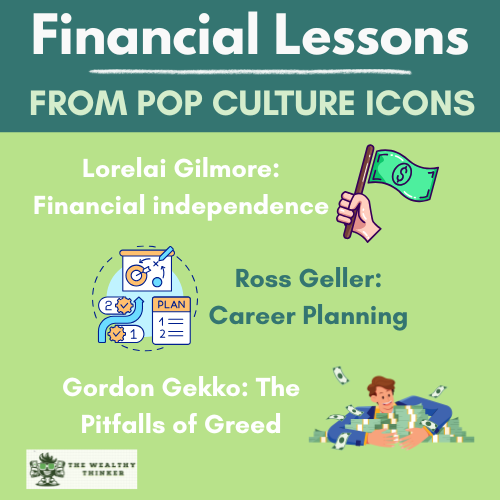TV shows and movies provide an immense amount of entertainment – but can they also teach us financial lessons?
Why not? Aside from giving us a reason to chill on our couches for a few hours, film and TV characters can also offer rich storylines that cover various financial topics.
Watching characters we come to know in (mostly) every day situations can allow us to understand complex financial concepts and lessons in a much more relatable way.
Here are three pop culture icons that serve as unexpected financial literacy teachers.

3 Surprising Financial Lessons from Pop Culture Icons
Pop Culture Icon #1: Ross Geller from “Friends”
“Friends” is an iconic TV sitcom. It’s still the favorite show of many and has a sustainable re-watchable factor. The stories of Rachel, Chandler, Phoebe, Monica, Joey and Ross are memorable, yet also remind us of our own lives.
Ross Geller is a beloved character, seen as the intellectual friend of the group. He has a Ph.D. in Paleontology and makes a few career moves in the show. While you may be familiar with Ross’s character in “Friends,” you may have never noticed some of his financial behaviors before.
Ross is a great example of how preparation can improve financial outcomes.
Ross’s career choice represents his investment in education. It really highlights the value of having a specialized skill in high-income roles.
- He started his professional career as a paleontologist.
- He eventually became a museum curator and, later on, a university professor.
This shows the importance of long-term career planning.
By having a career plan, Ross was able to use his education to work his way up and become an expert in his field. With this upward movement, he was able to increase his income.
When you watch Ross through the “Friends” seasons, you can see how having a career plan can lead to being financially prepared. This is particularly helpful when he has disruptive life events pop up, like three divorces and parenthood.
Because he can advance in his career, he is able to make plans to help him out financially. He also saves for the future, which helps him out through unpredictable financial events.
Key Financial Lessons from Ross Geller:
- The importance of investing in your education and career
- Planning for major life events and their financial impacts
- Budgeting for future financial responsibilities
Career Success & Personal Development: What are the 7 Key Factors?→
Pop Culture Icon #2: Lorelai Gilmore from “Gilmore Girls”
“Gilmore Girls” is a feel-good show about mother and daughter Lorelai and Rory Gilmore, who live in small town Stars Hollow.
Single mom entrepreneur Lorelai is known for her independence. While you may know Lorelai as a fun, coffee-obsessed character, you can learn many financial lessons from her as well.
If you’ve watched “Gilmore Girls,” then you know that Lorelai is proud of her independence. She comes from a wealthy background and left her parents at a young age.
She went on to live on her own, working her way up from being a maid to a manager at the Independence Inn, raising a daughter as a young, single mother, and eventually becoming a co-owner of the Dragonfly Inn.
Lorelai was focused on gaining financial independence to live her life over the life her parents wanted. Financial independence has its challenges, but overall, it can provide you with the life you want to live, even if it is not a lavish lifestyle.
Throughout the series, Lorelai works at the Independence Inn but dreams of owning her own Bed & Breakfast (B & B). So, she ventures into opening the Dragonfly Inn. This part of the show is a great way to see the financial challenges and rewards of starting your own business.
With her experience in the B & B industry, Lorelai is able to handle stressful situations that eventually lead her to a successful business.
A major part of this series is prioritizing her daughter’s education and investing in her future. Rory has the opportunity to attend a prestigious high school, but Lorelai is not able to afford this. She ends up asking her parents for help.
While the help is appreciated, this really shows how saving and having an emergency fund can help you reach your goals while maintaining your independence.
Key Financial Lessons from Lorelai Gilmore:
- The value of financial independence
- Challenges and rewards of entrepreneurship
- The need for savings and an emergency fund
Financial Independence: 5 Ways to Keep Your Eye on the Prize→
Pop Culture Icon #3: Gordon Gekko from “Wall Street”
There are so many different types of lessons you can learn in movies.
For example, the 1987 movie “Wall Street” teaches valuable lessons in business ethics and greed. Gordon Gekko is a wealthy investor and corporate raider who will do anything to succeed. He is iconic for his ruthless business tactics and risk-taking.
Gekko has built his wealth in unethical ways through insider trading and illegal activities. An extremely greedy and materialistic person, his mantra is “greed is good,” which shows you how he views money.
Along with this, he isn’t afraid to make risky investment options when there’s a high reward. In “Wall Street,” you can really see how these three elements can lead to Gekko’s downfall.
Being overly greedy and materialistic, with highly risky and unethical morals, leads to poor decision-making. When you watch “Wall Street,” you can see how these three things led to the rise of Gekko and how they aided in his eventual fall.
Key Financial Lessons from Gordon Gekko
- The dangers of unethical financial practices
- The pitfalls of excessive greed and materialism
- The importance of assessing risks before a large financial decision
Learning Financial Lessons from Pop Culture?
The next time you feel guilty about re-watching your favorite TV show or movie, think about how you can learn valuable financial lessons from what you’re watching!
Pop culture is an unexpected opportunity for financial education. The lessons you can learn from TV and movies can definitely be applied to your own financial life.
Editor’s note: This article was originally published Jun 20, 2024 and has been updated to improve reader experience.



















